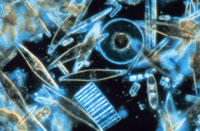
| Phytoplankton Vanishing from Oceans | 25 August 10 |
 A new Canadian study on microscopic phytoplankton, which form the foundation of the marine food chain, are declining. A new Canadian study on microscopic phytoplankton, which form the foundation of the marine food chain, are declining.Researchers at Dalhousie University in Halifax conducted the first global study in the past century, of the populations of these microscopic organisms, and found the declines – averaging about 1 per cent a year, and approximately 40 per cent since 1950 – correlate with increases in sea surface temperatures. Phytoplankton form the base of the aquatic food chain. The organisms live at the surface of the water, and are the main source of food for zooplankton, which are a food source for fish and other sea creatures. Phytoplankton are also a major source of oxygen for the atmosphere. "This is a definite wake-up call that our oceans are becoming increasingly stressed and this is another indicator of that," said lead author Dr. Daniel Boyce. "It's quite shocking to think that there's been a 40-per-cent decline at the base of the food chain over the past 50 years. I think it's absolutely cause for concern." The study found phytoplankton populations fell in eight of ten regions globally. These declines were occurring more rapidly in polar and tropical regions since 1950. Dr. Boyce said further research is needed to understand what's driving that trend. View July 29, 2010 Nature articleView July 28, 2010 Globe and Mail article View July 28, 2010 CBC News article View July 28, 2010 BBC News article View August 6, 2010 The Mark article Source: Globe and Mail |
|
 Print version Print version |
Top |
